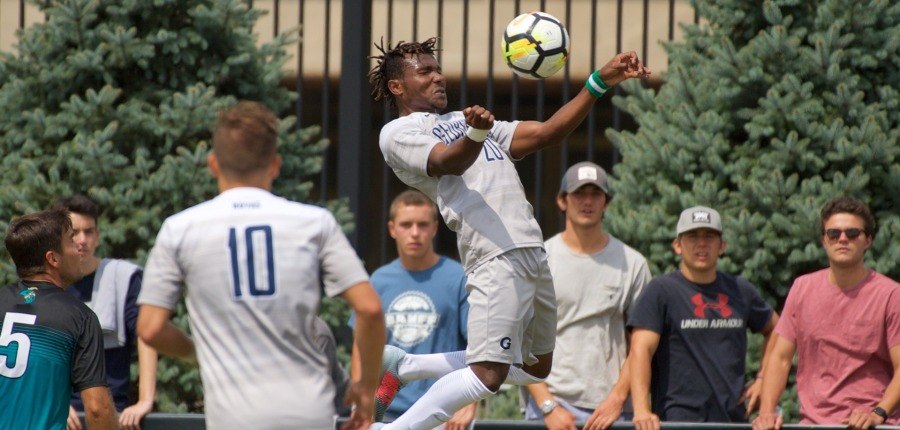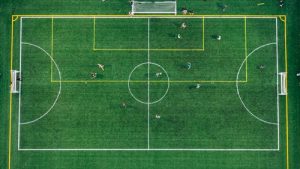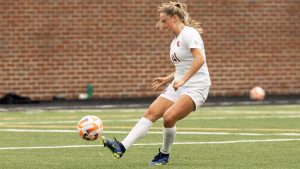Ifunanyachi is one of those rare examples of a player who is unplayable on his day. A combination of strength, pace, skill and athleticism is what makes the Nigerian born Achara a joy to behold. His hard-working approach and quality on the ball has endeared him to Georgetown and Big East soccer fans and quite often, the opposing ones too. If you haven't seen him play yet, well be ready to be dazzled.
The Nigerian powerhouse is one of the country's top college players going into the 2018 college soccer season. Achara has struggled with injuries in his first two years in college soccer, but eight goals in nineteen games shows his promise. Should he stay healthy throughout the upcoming season, he is a certainty for the 2019 MLS draft.
Born in Enugu, Achara grew up in the south east of Nigeria, in Enugu State. You could say he was a "street boy." He grew up on the street, played on the street, did everything out on the street. It was a difficult life altogether, but that's how he grew up among three siblings.
Achara always had soccer: something that everybody loves in Nigeria. It brings the whole country together, something that can bring peace and unity. When there's a World Cup or Africa Cup of Nations, every body's into it, whether young or old, rich or poor. It's like a festival going on, everybody wanting the Super Eagles, Nigeria’s national soccer team to win.
Achara and his friends had their own little stretch of street where they would always play. Other boys knew where it was and would always come there. Achara knew everybody and everybody knew him. He and his friends would take a stretch of the street, put posts down at each end and, if a car came, someone would call out and they’d have to stop to let it pass.
Weekends were the best time, especially Sundays, when everybody goes to church so the roads were really quiet. Sometimes they might have enough players to make three teams so whoever won stayed on for the next one. They just played, no referee, no rules. All they needed was something to put down to make goal posts and play with a rubber ball. If they were lucky, it might be like a tennis ball; something perfectly round. But often the ball wouldn't be like that. They wouldn't know where it was going to bounce. Maybe that helped Achara become the sort of player he is today. Maybe it was using a ball that he couldn't figure out where it would bounce next that helped him develop his skills and ball control.
Sometimes he would go to play on a "field", usually at a school nearby. That's a pitch, not a pitch like here in the United States that is beautiful: green and flat. Back in his home country of Nigeria, it would be a hard, dry surface. Every time Achara fell over, he'd get cuts and bruizes but he continued to play because he loved the game. He wouldn't even feel those scratches. He was full of energy and would play from morning until night unless his parents shouted at him to come inside. Achura would forget everything; forget to eat, he didn't have any kind of coaching until he was older. When he was younger, seven or eight, he just played and that is how his skill grew..
Achara had skills from an early age, people noticed, none more so than legendary Nigerian playmaker Jay Jay Okocha, who saw Achara play in a tournament and recommended that he be brought onto the Nigerian U-17 national team setup, a team that would eventually go on to win the U-17 World Cup. Although Achara was cut from the team leading up to the World Cup, it was a great experience for him, something that drove him to be better. It gave him a sense of how good he was and that provided confidence and encouragement, for football and for the rest of his life, too.
Achara then had the opportunity to come to America to better himself. While playing and starring in a tournament back in Nigeria, Achara was spotted by American coaches, something that would never have happened if not for his drive to succeed. During the tournament he injured his ankle but instead of sitting out he kept going, scoring two goals in the process.
Achara ended up at Berkshire High School in Massachusetts. At Berkshire he was named to the High School All-America game Best 11 his senior year. While at Berkshire he played alongside current England U-21 international Jack Harrison and Charlotte Independence winger Mutaya Mwape. After Bershire Achara committed to Georgetown University where he has flourished in the Big East Conference but his trajectory has been curtailed thus far by injuries. Yet whenever he has appeared on the field for Georgetown he has been a menace, scoring in important games for the Hoyas.
 Achara chose Georgetown for various reasons, none more so than the style of play and how the Hoya coaches develop players. It wasn't just about winning for Achara, it was more about developing as a player and as a person. Georgetown has provided Achara the tools and coaching he needs to succeed despite struggling with injuries so far in his college career.
Achara chose Georgetown for various reasons, none more so than the style of play and how the Hoya coaches develop players. It wasn't just about winning for Achara, it was more about developing as a player and as a person. Georgetown has provided Achara the tools and coaching he needs to succeed despite struggling with injuries so far in his college career.
Coach Wiese and his coaching staff as well as Achara’s teammates know that there is an extra few gears he is yet to reach. It only makes it easier that he is surrounded by amazing players. His experience at Georgetown so far has been unique and one that he indicates he wouldn’t trade for anything else. Achara feels fortunate to have Coach Wiese and his staff believe in him through his difficult time with injuries and continue to help him develop into the player and person he aims to be.
Achara’s time at the Berkshire School and growing up stateside was an important time period in his life. It was always a dream of his to combine academics with soccer and Berkshire provided him with an avenue to excel at both. The challenge was good for him and motivated him to stay sharp and to keep improving. Spending time with Manhattan Soccer Club has also provided Achara with an environment to compete and get better each and every day.
With the 2018 college soccer season fast approaching, the young Nigerian has one thing on his mind and that is to show his full ability at the college level and continue to work towards his dream of playing professional soccer.
Dela Agbotse is a contributing writer for College Soccer News. He can be reached at dela.agbotse11@gmail.com





